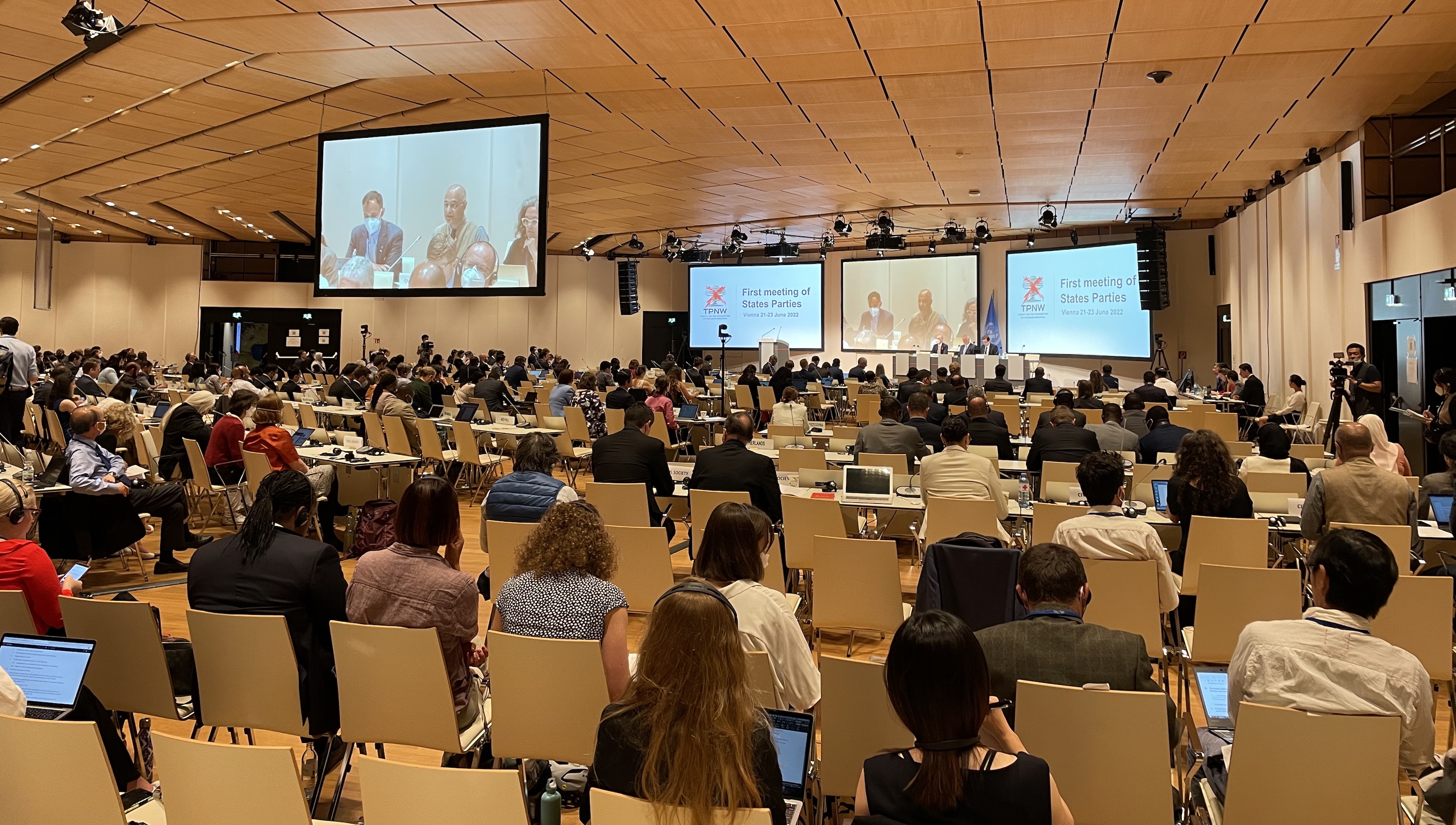August 15, 2022
SGS researchers were active participants in three meetings in Vienna from June 18-23, 2022, organized around the first meeting of states parties to the United Nations Treaty on the Prohibition of Nuclear Weapons (TPNW). This participation builds on constructive engagement by SGS researchers in the process leading to the treaty, including in the negotiating conference at the United Nations in 2017, leading to the adoption of the treaty by 122 countries. The treaty entered into force on 22 January 2021.
The week began with the two-day Nuclear Ban Forum organized by the International Campaign to Abolish Nuclear Weapons (ICAN), a coalition of nongovernmental groups from 100 countries that was awarded the 2017 Nobel Peace Prize for its work leading to the treaty. The Nuclear Ban Forum brought together 600 participants from around the world to connect, discuss and prepare for the first meeting of TPNW states and mobilize to support treaty implementation. At the Forum, Ray Acheson a visiting researcher with SGS from the Women’s International League for Peace and Freedom, where they lead the disarmament program Reaching Critical Will, spoke on The Ban is the Plan, explaining how the TPNW was achieved as a multilateral nuclear disarmament treaty. Acheson also chaired the panel on Hues Of Hope And Aspects Of Understanding about the award-winning VR documentary film On the Morning You Wake, which began as a project at SGS. Alexander Glaser and Tamara Patton from SGS served as executive producers of the film.
Zia Mian spoke as part of a Forum panel discussion on Weapons Grade Colonialism that explored how different kinds of power, violence and injustice are manifest in nuclear weapons policies, practices and institutions and where and how to organize opposition. Pavel Podvig of SGS, who also is a Senior Researcher in the WMD Programme at UNIDIR, spoke on the problems of the utility, usability, and rationality of nuclear weapons and strategies in the Debating Deterrence session. SGS visiting researcher Moritz Kütt, who also is a Senior Researcher at the Institute for Peace Research and Security Policy at the University of Hamburg, discussed NATO nuclear weapon sharing arrangements under which five countries in Europe host US nuclear weapons.
The ICAN Nuclear Ban Forum was followed on June 20, 2022 by the Vienna Humanitarian Impact of Nuclear Weapons conference, organized by Austria’s Federal Ministry for European and International Affairs. It attracted more than 800 participants, from more than 80 states. Earlier such conferences in Oslo (March 2013), Nayarit (February 2014) and Vienna (December 2014), helped lay the basis for TPNW negotiation and adoption.
Moritz Kütt presented in the session “Impact of Nuclear Weapons on People and the Planet: New Developments and Findings.” The talk There are no Small Nuclear Weapons explained that even a single nuclear explosion much smaller than the ones that destroyed Hiroshima and Nagasaki in 1945 has devastating effects. Beyond immediate physical effects, news and social media responses will generate unknown traumatic social and psychological impacts globally.
Alexander Glaser presented on behalf of SGS researcher Sébastien Philippe on Reconstructing the Radiological Impact from Past Nuclear Tests. The talk explained how combining current understanding of nuclear weapon explosions, modern fallout simulation techniques, and archival research now makes it possible to revisit the radiological and environmental impacts of past nuclear testing anywhere especially in places where they remain poorly documented.
Zia Mian talked about What we Know, Don’t Know, Won’t Know, Can’t Know: Lessons from South Asia on Nuclear Risks as Complex and Incomprehensible. This was in the conference’s concluding session “The Risks of Nuclear Weapons, the Threat of Use and Nuclear Deterrence: New Developments and Findings, and the Limits of Our Knowledge.” Mian argued that real world nuclear risks are complex and likely incomprehensible.
SGS also participated in the June 21-23, 2022, first meeting of TPNW states that included delegates from 83 states (including observes states) and 85 nongovernmental organizations. The meeting adopted the declaration Our Commitment to a World Free of Nuclear Weapons and an Action Plan to take the treaty forward. States used research by SGS as a basis to adopt a ten-year deadline for the destruction of nuclear weapons by a weapon state joining the treaty and a 90-day deadline from removing nuclear weapons from a state hosting such weapons upon joining the treaty. Moritz Kütt made a presentation to the meeting explaining the two deadlines. In his presentation to the meeting, Zia Mian made the case for establishing a scientific advisory group for TPNW states, based on a proposal by SGS researchers. The meeting of TPNW states decided to establish a scientific advisory group.
